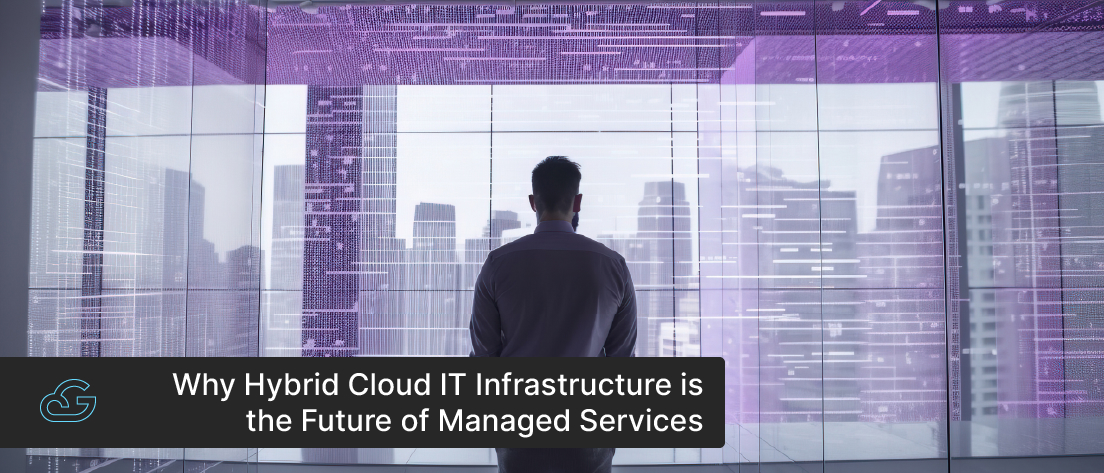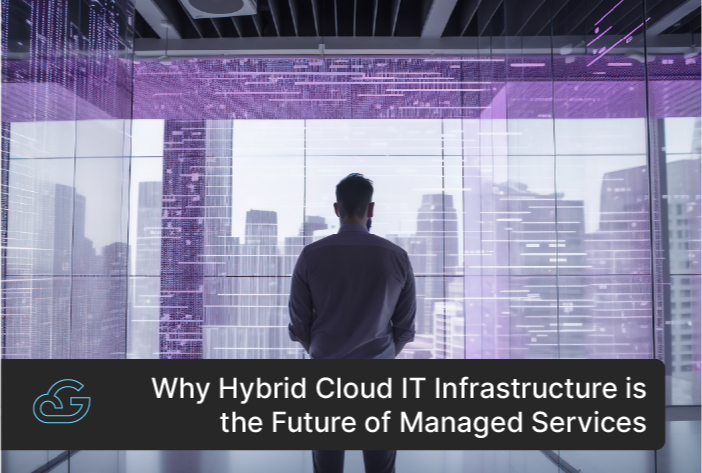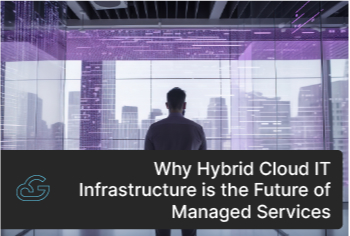Blogs / Managed Services
Why Hybrid Cloud IT Infrastructure Is The Future Of Managed Services
By
Sibin Vincent
Posted: November 06, 2023
• 4 Min Read
With data being ubiquitous, cloud adoption has indeed become the new normal for businesses. When it comes to managing data, businesses are often faced with a choice between two options namely public or private clouds. Public clouds allow businesses to host their data and software on shared physical hardware owned by third-party service providers like Amazon Web Services (AWS), Microsoft Azure, and Google Cloud. While this option offers a range of choices and attractive prices, it comes with the risk of compromising highly sensitive data and security non-compliance.

Private clouds have emerged as a solution to address the risks associated with storing data in public cloud environments by providing dedicated and secure access to data. However, businesses have come to realize that they also need the support and integration of data between different clouds to improve their overall capacity and performance. This led to the development of the hybrid cloud, where some applications and data are hosted on the public cloud, while others are stored on private cloud infrastructure.
What Makes The Hybrid Cloud Model So Appealing?
According to reports, the hybrid cloud market is predicted to reach $128 billion by 2025, and it is not surprising that it is gaining popularity among businesses due to the many benefits it offers. These benefits are the reason behind the hype surrounding hybrid cloud technology.
-
The hybrid cloud model combines the best of both worlds - the scalability and cost-efficiency of the public cloud with the security and control of private infrastructure. This enables businesses to leverage their existing on-premises investments while taking advantage of the flexibility and scalability of public cloud platforms such as AWS and Azure.
-
With the hybrid cloud, businesses can also optimize their resources, reduce costs, and improve performance, all while maintaining the highest level of security and compliance.
-
The hybrid cloud strategy combines multiple platforms, including software, and hardware, and delivers apps through the cloud. It allows businesses to achieve strength, cost efficiency, and agility in their IT infrastructure.
The evolution of hybrid cloud services is expected to continue in the coming years, driven by advancements in automation, machine learning, and artificial intelligence. These technologies will play a crucial role in enabling businesses to optimize their hybrid cloud deployments and achieve even greater efficiency in their operations.
How Managed Service Providers Help You Manage Your Hybrid Cloud Environment?
A successful transition to the cloud requires a thorough understanding of the complexity of cloud deployment. Unfortunately, unsuccessful cloud deployments are not uncommon, and they can result from a variety of factors such as integration problems, poor choice of provider, inaccurate cost estimates, or unexpected cost increases. Understanding the role of managed service providers in addressing hybrid cloud challenges is therefore essential.
Navigating Cloud Deployment Challenges
Managing a complex application estate across on-premises infrastructure and multiple cloud platforms can be overwhelming. MSPs provide specialized services to help businesses navigate and streamline cloud deployment and management.
Ensuring Seamless Operations
MSPs offer expertise in coordinating complex deployments and making applications and data streams interoperable. They fill the gap left by hyperscaler cloud providers who focus on tools but not service aspects.
Leveraging the Hybrid Cloud Landscape
Hyperscalers partner with MSPs to encourage cloud consumption and maintain on-premises infrastructure. This partnership allows companies to optimize their hybrid cloud deployments without the complexity of managing multiple clouds.
Building Technology Roadmaps
MSPs assist in developing technology roadmaps for effective cloud solutions. They help companies launch, control, and maintain cloud environments while ensuring seamless operations.
Integrating Public Cloud with On-Premises Infrastructure
MSPs with experience in mainframe and cloud technologies excel at integrating the public cloud with on-premises infrastructure. They provide the necessary services and expertise for hybrid cloud integration.
Seamless Interoperability
MSPs ensure seamless interoperability between on-premises and cloud environments. They offer specialized expertise to integrate hybrid cloud infrastructure effectively. By leveraging the expertise of MSPs, businesses can overcome the challenges of managing hybrid cloud environments and optimize their cloud deployments for efficient operations.
How Gsoft Empowers Your Business With Our Managed Hybrid Cloud Services
“The managed cloud service market is forecast to reach $102 billion in 2025, growing at a five-year compound annual growth rate of 19.1% in U.S. dollars.”
The MSP market is expected to grow as businesses seek specialized services and expertise for hybrid cloud optimization. MSPs help develop the right mix of public, private, and hybrid cloud solutions aligned with business needs and growth objectives.
As your trusted managed service provider, Gsoft understands the complexities of your hybrid cloud environments and offers unique software development services to assist you in achieving digital resilience. Our hybrid cloud consulting services provide expert guidance to enable you to develop a cloud strategy, build a cloud environment, and migrate, transform, and build applications across cloud platforms. We also offer cloud managed services to optimize and secure your distributed cloud landscape while reducing IT costs and increasing responsiveness to changing business requirements.
Moving to the cloud requires a significant mindset shift that affects the entire organization, from technology and processes to personnel and skills. Therefore, it is crucial to understand the impact of these changes before deciding on a hybrid cloud model. If you are considering a move to hybrid cloud services, we can help you navigate the process with minimal disruptions to your business. Contact us today to learn whether hybrid cloud services are right for your company and your customers.


Get Know More About Our Services and Products
Reach to us if you have any queries on any of our products or Services.











